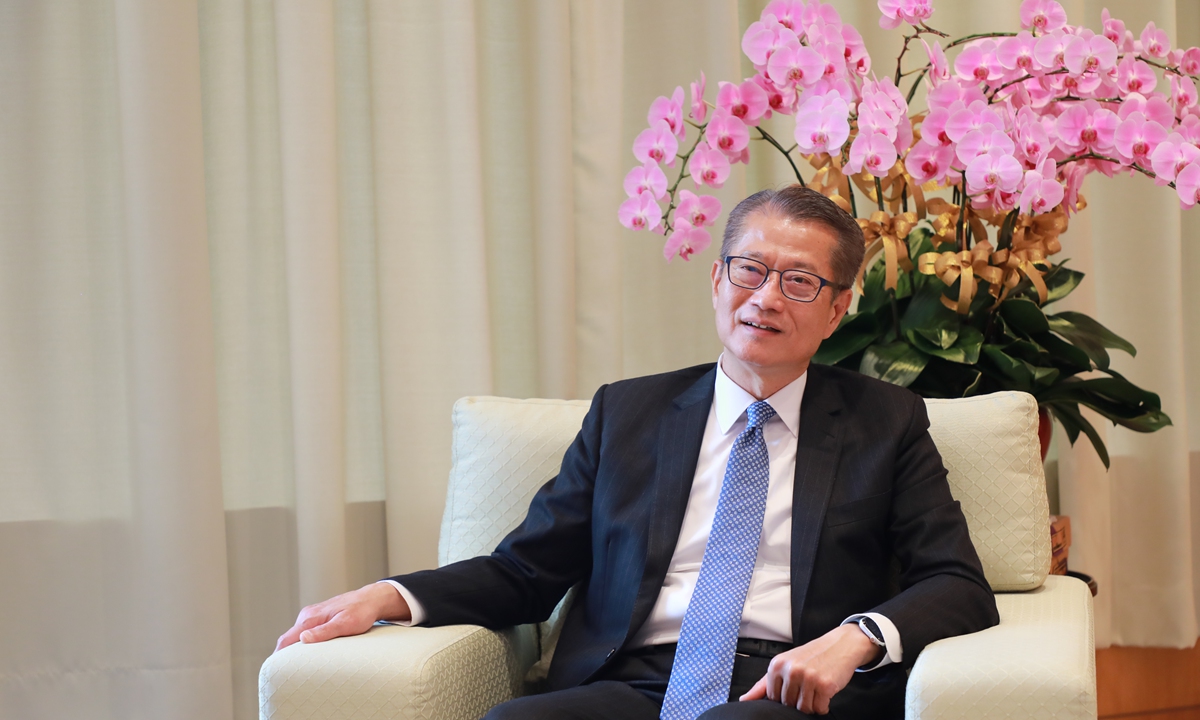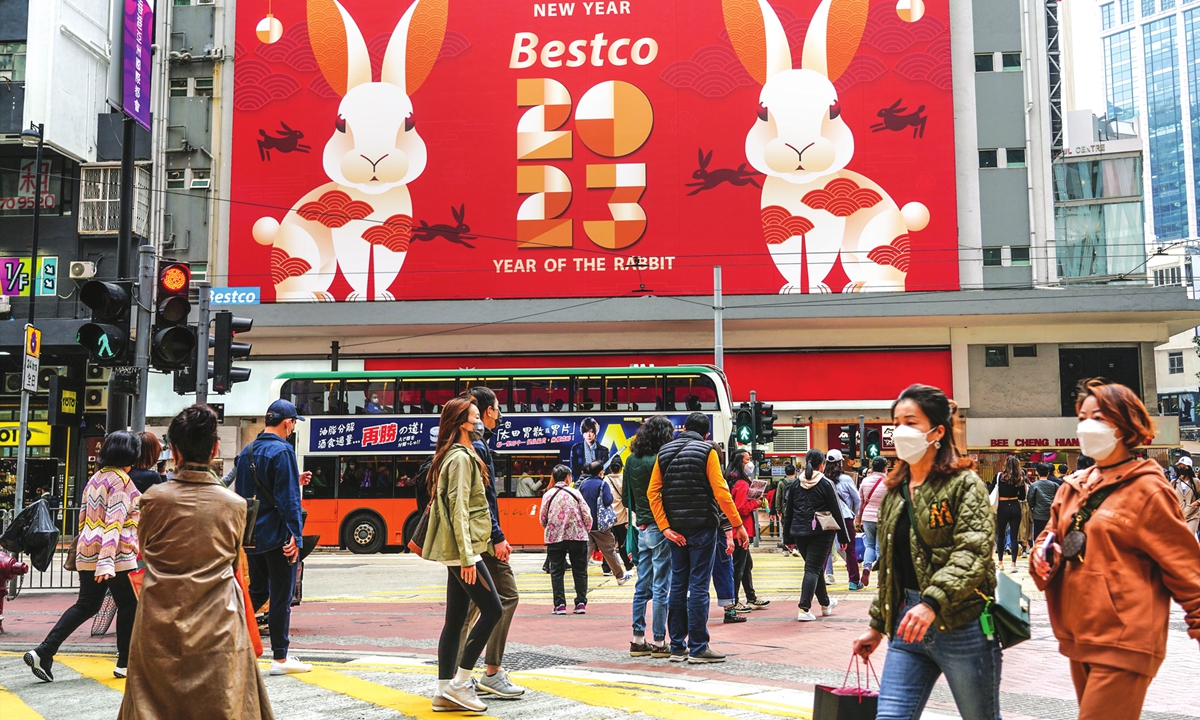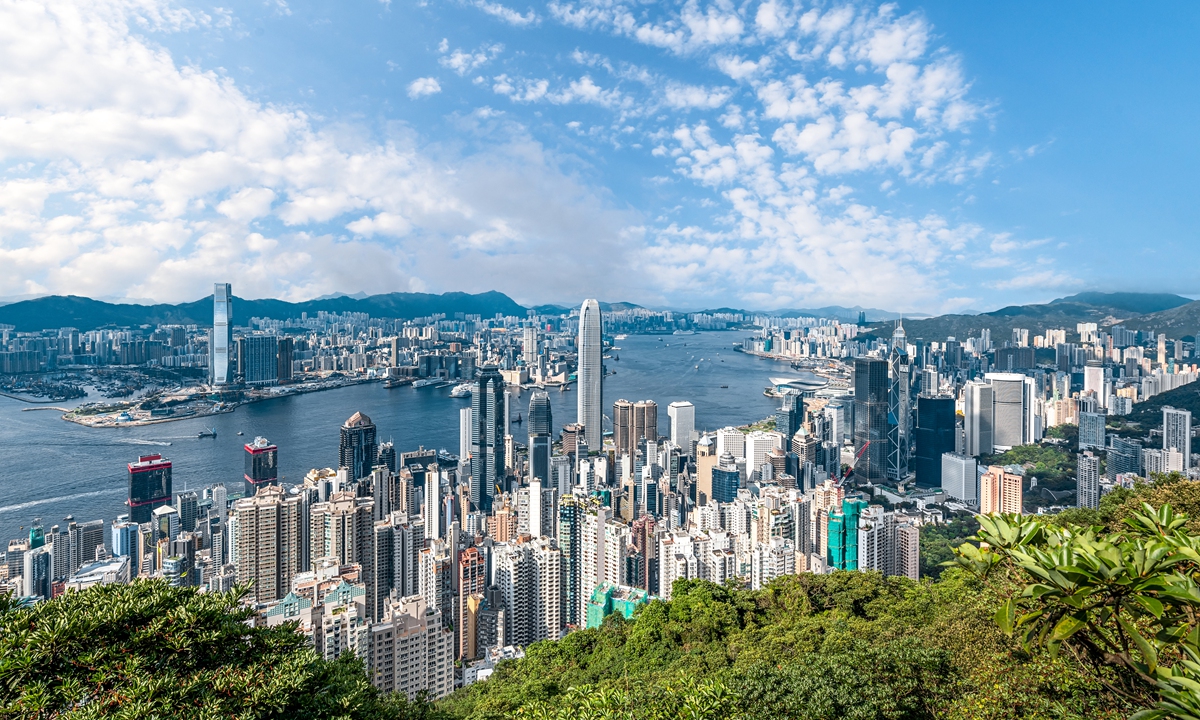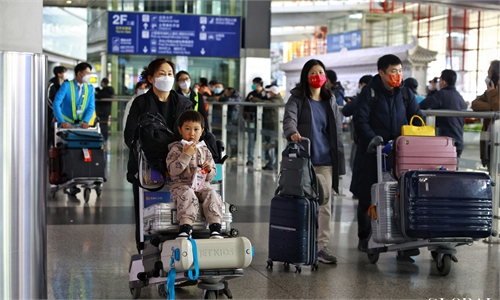IN-DEPTH / IN-DEPTH
Exclusive: After the border reopening, Hong Kong continues to rebound and be vibrant with abundant opportunities: HK financial chief
Fruitful projection
Editor's Note:
The recent border reopening between the Chinese mainland and Hong Kong has injected much-needed vitality and enthusiasm into the city's economic development and is perceived by Hong Kong's business communities as a start to Hong Kong's strong comeback. Global Times reporter Zhao Juecheng (GT) conducted an exclusive interview with Paul Chan Mo-po (Chan), financial secretary of the Hong Kong Special Administrative Region (HKSAR) government, on Wednesday. Chan talked about his expectation of Hong Kong's rapid economic growth in 2023 following the border reopening, and the city's plan to diversify its economic development model, as part of the efforts to weather a complicated international environment.

Chan: It is the first time in a long period that many important guests have shown up on the scene, including the former secretary-general of the United Nations Ban Ki-Moon. We are excited to see delegations from other countries, which shows the world that Hong Kong did not just make a comeback; the city has always boomed with opportunities and vitality.
GT: What significance do you think border reopening between the mainland and Hong Kong has for Hong Kong's economic recovery, the progression of the construction of the Guangdong-Hong Kong-Macao Greater Bay Area (Greater Bay Area) and Hong Kong's integration into the rest of the country?
Chan: The border reopening is much anticipated and is inspiring for us. Previously, we thought Hong Kong's economy in 2023 would face challenges because of geopolitical tussle and the Hong Kong dollar being pegged against the US dollar, thus interest rates in Hong Kong would be on the rise. But after the reopening of the border, there is increased positivity throughout Hong Kong society, which is going to propel the rapid recovery of Hong Kong's economy.
Travel was made easy for people from both the mainland and Hong Kong, so business trips can now be resumed along with tourism. Retail trade will also greatly benefit from the border reopening.
Plus, the move can also stimulate the development of the Greater Bay Area. When I sell Hong Kong's advantages to other countries, they express wide interests in the development of the Greater Bay Area, and are optimistic about the whole country's economic prospects. Some people have chosen to start businesses in Hong Kong and are also eyeing the launch of businesses in the mainland, via the Greater Bay Area. Recently, we also saw many business delegations from other countries and regions coming to Hong Kong.
GT: Do you have plans to travel to the mainland in the near future?
Chan: We already had plans to visit Beijing after the two sessions (in March) this year. We will also stretch our visit to other mainland cities (and provinces) such as Shanghai, Guangzhou, Zhejiang, and others. We rarely visited those cities due to COVID-19 in the last three years. So we will be able get to know the situation in the mainland and let them know about Hong Kong.
GT: Many have predicted that mainland's economy will rapidly rebound in 2023. What benefits do you think such a rebound will bring to Hong Kong and do you have a prediction for Hong Kong's own economy this year?
Chan: The whole country's rapid economic development injects confidence into Hong Kong's economic development. The border reopening is of great help as the transportation between the mainland and Hong Kong had been disrupted by COVID-19. We expect a huge rise in shipping and air transportation.
We believe that mainland tourists will also flock to Hong Kong this year, as research shows that Hong Kong is still the top travel destination for mainland tourists. Such a trend will greatly stimulate Hong Kong's tourism industry, among others.
Moreover, Hong Kong has been focused on technological revitalization in recent years, and this area requires close links and exchanges with the mainland. In the Greater Bay Area, cities such as Shenzhen are leaders in the technological revolution, so integration with the mainland will also help in this area.
The new Hong Kong SAR government is also trying to attract talent. Many companies in the mainland are interested in opening their international headquarters in Hong Kong. Apart from some key companies, some technology-based companies are also eyeing Hong Kong as a base in which to expand their businesses.
Talent is the pillar that holds Hong Kong's economic development. After the border reopening, we hope that more people from mainland will come to Hong Kong, whether to stay long term or just to cooperate with Hong Kong's companies; they will greatly boost Hong Kong's economic development.
Surely, this year will be better than 2022 and will see significant growth, especially after the SAR government has rolls out policies for talent attraction and company investment, as Hong Kong's economy has suffered in the last few years. Although the challenges this year will be great, we remain optimistic.

Chan: We have several aspects to consider when it comes to Hong Kong's economy. First, we hope that the industry structure can be elevated. The financial sector is the city's strength and has contributed about 23 percent of Hong Kong's GDP, but provided only 7 percent employment; professional services account for 10 percent of the city's GDP and contribute a similar percentage of employment. Hong Kong needs diversified development and technological innovation.
By promoting technological development, young people can have more and better employment. And different industries have different economic cycles, which can strengthen the city's ability to weather business cycles.
After Chief Executive John Lee delivered his first annual policy address in October 2022, many companies in the mainland reached out to us and we also reached out to businesses in the mainland. Apart from key businesses, we also found other small and medium-sized companies which own cutting-edge technologies are interested in accessing the international market.
Hong Kong also issued policies on virtual assets in 2022, which attracted wide attention. What we are planning to do is embrace finance, revitalization and technology, which are the historic trends; but at the same time we need to be cautious of their risks. So we need to both promote those industries and roll out regulations to protect investors.
GT: Some international indexes have showed fluctuation in Hong Kong's ranking. Do you worry that Hong Kong's status as the financial center may decline further in the future?
Chan: We've been through very difficult times in the last three years. First were the violent riots in 2019 and then the COVID-19 epidemic. During the same period, we inevitably had less contacts with the mainland and the international community, and so was there a decline in people coming to visit Hong Kong, which led to more misunderstandings.
In November 2022, I invited some 100 representatives from global financial institutions for a financial leadership summit. Many are chairmen and executive officers in those international companies. After they visited Hong Kong in person, they realized that many reports (about Hong Kong) by Western media were biased and misunderstood the city. The reality is that Hong Kong is a city full of vitality and is in good governance.
Some of them later told me they will expand their businesses in Hong Kong and transfer their senior management to the city from overseas. Why? Because they trust the great opportunity in the financial sector of the Greater Bay Area and Hong Kong where both enjoy strong backing from the motherland. It's very inspiring to me.
This year we will also host a financial summit on a greater scale among other international conferences. Many international financial organizations, financial regulators, and transnational nonprofit organizations have agreed to move their meetings to Hong Kong which will offer chances for their top managers and board of directors to visit and understand Hong Kong themselves.
As we continue to issue invitations to international financial organizations, we will also venture forth to tell stories about Hong Kong, elaborating on the city's vitality and potential. For international conferences and exhibitions that have already transferred to other places, we will get them back, with good policies and support. Many have said yes.
Hong Kong takes international financial centers like London and New York as benchmarks. When considering the benchmark, we have great confidence about achieving it.
First of all, China is the second-largest economy in the world. It has the largest annual economic growth in the world, and it contributes more than 30 percent of the global economic growth. Hong Kong, as the country's international financial center, has great potential when it serves economical entities, even when compared to Singapore.
Second, Hong Kong can play a good role as an offshore Chinese yuan market hub as the country develops yuan internationalization. Many countries need to diversify their investment to reduce risks because they have started to voice concern over the US dollar and related polices due to recent years of contributory geopolitical factors.
Third, on the stock market, especially the initial public offerings, we will continue to stay ahead of the market and maintain our competitiveness. We should not be complacent. After all, the competition is fierce.
For example, we revised some listing rules in 2018, so that industrial companies with the same shares and different rights could be listed in Hong Kong. It has pushed our stock market to a new level, not just in terms of market value, but also in terms of daily trading volume.
In addition to that, we also introduce privately offered funds to Hong Kong which can enjoy the Greater Bay Area market. Hong Kong also has its special place on connectivity which is a key part of the country's financial reform.
That's why I am full of confidence in Hong Kong as an international financial center. The market value of stocks in Hong Kong was 6 times that of Singapore by the end of November 2022, and our trading volume was at least 20 times that of Singapore. It is not comparable. But we should also be vigilant and will make continued efforts as the competition is global.

Chan: We should seize the situation. Different countries and regions have different economic cycles. Geopolitics is also an important consideration. While we sustain the current market, we also explore new markets, especially those with better development prospects. The Middle East is definitely a good place, and so are ASEAN member countries. Asia as a whole will contribute about one-third of global growth, and the mainland plus Asia already account for two-thirds of global growth. The main economies in Europe including France and Germany which are relatively independent in foreign diplomacy are also within our target.
GT: How will Hong Kong strike a balance between playing a bridge role in the country's connectivity with the rest of the world and assisting the mainland to resist risks of a gloomy world economy?
Chan: The One Country, Two Systems makes Hong Kong a special place with special advantages. We'll make full use of the advantages. Hong Kong has always been an important window and bridge of the country to the outside world, and also a testing site and firewall, especially in the financial sector.
Through more communication with relevant departments and ministries on the mainland and different policies, we can use Hong Kong as a platform to help open up the mainland market.
GT: How do you see the economy potential of the mainland after three years of the epidemic?
Chan: I'm positive about the mainland's economic development. After recent years of COVID-19, the mainland still has a lot of room for development, whether through monetary or fiscal policies. Strong momentum lays head for the country.
The country's move of lifting quarantine measures for inbound travelers benefits exports and investment. The "dual circulation" development paradigm, as well as the digital economy in innovative technology development will generate great power for the economy.
The recent border reopening between the Chinese mainland and Hong Kong has injected much-needed vitality and enthusiasm into the city's economic development and is perceived by Hong Kong's business communities as a start to Hong Kong's strong comeback. Global Times reporter Zhao Juecheng (GT) conducted an exclusive interview with Paul Chan Mo-po (Chan), financial secretary of the Hong Kong Special Administrative Region (HKSAR) government, on Wednesday. Chan talked about his expectation of Hong Kong's rapid economic growth in 2023 following the border reopening, and the city's plan to diversify its economic development model, as part of the efforts to weather a complicated international environment.

Paul Chan Mo-po Photo: Yun Tianhua/GT
GT: Can you share with us your feelings on attending the Asian Financial Forum, which kicked off on Wednesday and is the first important event in Hong Kong this year?Chan: It is the first time in a long period that many important guests have shown up on the scene, including the former secretary-general of the United Nations Ban Ki-Moon. We are excited to see delegations from other countries, which shows the world that Hong Kong did not just make a comeback; the city has always boomed with opportunities and vitality.
GT: What significance do you think border reopening between the mainland and Hong Kong has for Hong Kong's economic recovery, the progression of the construction of the Guangdong-Hong Kong-Macao Greater Bay Area (Greater Bay Area) and Hong Kong's integration into the rest of the country?
Chan: The border reopening is much anticipated and is inspiring for us. Previously, we thought Hong Kong's economy in 2023 would face challenges because of geopolitical tussle and the Hong Kong dollar being pegged against the US dollar, thus interest rates in Hong Kong would be on the rise. But after the reopening of the border, there is increased positivity throughout Hong Kong society, which is going to propel the rapid recovery of Hong Kong's economy.
Travel was made easy for people from both the mainland and Hong Kong, so business trips can now be resumed along with tourism. Retail trade will also greatly benefit from the border reopening.
Plus, the move can also stimulate the development of the Greater Bay Area. When I sell Hong Kong's advantages to other countries, they express wide interests in the development of the Greater Bay Area, and are optimistic about the whole country's economic prospects. Some people have chosen to start businesses in Hong Kong and are also eyeing the launch of businesses in the mainland, via the Greater Bay Area. Recently, we also saw many business delegations from other countries and regions coming to Hong Kong.
GT: Do you have plans to travel to the mainland in the near future?
Chan: We already had plans to visit Beijing after the two sessions (in March) this year. We will also stretch our visit to other mainland cities (and provinces) such as Shanghai, Guangzhou, Zhejiang, and others. We rarely visited those cities due to COVID-19 in the last three years. So we will be able get to know the situation in the mainland and let them know about Hong Kong.
GT: Many have predicted that mainland's economy will rapidly rebound in 2023. What benefits do you think such a rebound will bring to Hong Kong and do you have a prediction for Hong Kong's own economy this year?
Chan: The whole country's rapid economic development injects confidence into Hong Kong's economic development. The border reopening is of great help as the transportation between the mainland and Hong Kong had been disrupted by COVID-19. We expect a huge rise in shipping and air transportation.
We believe that mainland tourists will also flock to Hong Kong this year, as research shows that Hong Kong is still the top travel destination for mainland tourists. Such a trend will greatly stimulate Hong Kong's tourism industry, among others.
Moreover, Hong Kong has been focused on technological revitalization in recent years, and this area requires close links and exchanges with the mainland. In the Greater Bay Area, cities such as Shenzhen are leaders in the technological revolution, so integration with the mainland will also help in this area.
The new Hong Kong SAR government is also trying to attract talent. Many companies in the mainland are interested in opening their international headquarters in Hong Kong. Apart from some key companies, some technology-based companies are also eyeing Hong Kong as a base in which to expand their businesses.
Talent is the pillar that holds Hong Kong's economic development. After the border reopening, we hope that more people from mainland will come to Hong Kong, whether to stay long term or just to cooperate with Hong Kong's companies; they will greatly boost Hong Kong's economic development.
Surely, this year will be better than 2022 and will see significant growth, especially after the SAR government has rolls out policies for talent attraction and company investment, as Hong Kong's economy has suffered in the last few years. Although the challenges this year will be great, we remain optimistic.

People shop and relax at Causeway Bay in Hong Kong on January 2. Photo: cnsphoto
GT: Have Hong Kong's policies to attract companies achieved any results? Some media also say that Hong Kong's move to attract talent is because of brain drain. How do you respond?Chan: We have several aspects to consider when it comes to Hong Kong's economy. First, we hope that the industry structure can be elevated. The financial sector is the city's strength and has contributed about 23 percent of Hong Kong's GDP, but provided only 7 percent employment; professional services account for 10 percent of the city's GDP and contribute a similar percentage of employment. Hong Kong needs diversified development and technological innovation.
By promoting technological development, young people can have more and better employment. And different industries have different economic cycles, which can strengthen the city's ability to weather business cycles.
After Chief Executive John Lee delivered his first annual policy address in October 2022, many companies in the mainland reached out to us and we also reached out to businesses in the mainland. Apart from key businesses, we also found other small and medium-sized companies which own cutting-edge technologies are interested in accessing the international market.
Hong Kong also issued policies on virtual assets in 2022, which attracted wide attention. What we are planning to do is embrace finance, revitalization and technology, which are the historic trends; but at the same time we need to be cautious of their risks. So we need to both promote those industries and roll out regulations to protect investors.
GT: Some international indexes have showed fluctuation in Hong Kong's ranking. Do you worry that Hong Kong's status as the financial center may decline further in the future?
Chan: We've been through very difficult times in the last three years. First were the violent riots in 2019 and then the COVID-19 epidemic. During the same period, we inevitably had less contacts with the mainland and the international community, and so was there a decline in people coming to visit Hong Kong, which led to more misunderstandings.
In November 2022, I invited some 100 representatives from global financial institutions for a financial leadership summit. Many are chairmen and executive officers in those international companies. After they visited Hong Kong in person, they realized that many reports (about Hong Kong) by Western media were biased and misunderstood the city. The reality is that Hong Kong is a city full of vitality and is in good governance.
Some of them later told me they will expand their businesses in Hong Kong and transfer their senior management to the city from overseas. Why? Because they trust the great opportunity in the financial sector of the Greater Bay Area and Hong Kong where both enjoy strong backing from the motherland. It's very inspiring to me.
This year we will also host a financial summit on a greater scale among other international conferences. Many international financial organizations, financial regulators, and transnational nonprofit organizations have agreed to move their meetings to Hong Kong which will offer chances for their top managers and board of directors to visit and understand Hong Kong themselves.
As we continue to issue invitations to international financial organizations, we will also venture forth to tell stories about Hong Kong, elaborating on the city's vitality and potential. For international conferences and exhibitions that have already transferred to other places, we will get them back, with good policies and support. Many have said yes.
Hong Kong takes international financial centers like London and New York as benchmarks. When considering the benchmark, we have great confidence about achieving it.
First of all, China is the second-largest economy in the world. It has the largest annual economic growth in the world, and it contributes more than 30 percent of the global economic growth. Hong Kong, as the country's international financial center, has great potential when it serves economical entities, even when compared to Singapore.
Second, Hong Kong can play a good role as an offshore Chinese yuan market hub as the country develops yuan internationalization. Many countries need to diversify their investment to reduce risks because they have started to voice concern over the US dollar and related polices due to recent years of contributory geopolitical factors.
Third, on the stock market, especially the initial public offerings, we will continue to stay ahead of the market and maintain our competitiveness. We should not be complacent. After all, the competition is fierce.
For example, we revised some listing rules in 2018, so that industrial companies with the same shares and different rights could be listed in Hong Kong. It has pushed our stock market to a new level, not just in terms of market value, but also in terms of daily trading volume.
In addition to that, we also introduce privately offered funds to Hong Kong which can enjoy the Greater Bay Area market. Hong Kong also has its special place on connectivity which is a key part of the country's financial reform.
That's why I am full of confidence in Hong Kong as an international financial center. The market value of stocks in Hong Kong was 6 times that of Singapore by the end of November 2022, and our trading volume was at least 20 times that of Singapore. It is not comparable. But we should also be vigilant and will make continued efforts as the competition is global.

An aerial view of Hong Kong Photo: VCG
GT: We noticed you have planned some foreign visits including to Europe and the Association of Southeast Asian Nations (ASEAN) members which raise speculations about whether Hong Kong is shifting its focus of business cooperation?Chan: We should seize the situation. Different countries and regions have different economic cycles. Geopolitics is also an important consideration. While we sustain the current market, we also explore new markets, especially those with better development prospects. The Middle East is definitely a good place, and so are ASEAN member countries. Asia as a whole will contribute about one-third of global growth, and the mainland plus Asia already account for two-thirds of global growth. The main economies in Europe including France and Germany which are relatively independent in foreign diplomacy are also within our target.
GT: How will Hong Kong strike a balance between playing a bridge role in the country's connectivity with the rest of the world and assisting the mainland to resist risks of a gloomy world economy?
Chan: The One Country, Two Systems makes Hong Kong a special place with special advantages. We'll make full use of the advantages. Hong Kong has always been an important window and bridge of the country to the outside world, and also a testing site and firewall, especially in the financial sector.
Through more communication with relevant departments and ministries on the mainland and different policies, we can use Hong Kong as a platform to help open up the mainland market.
GT: How do you see the economy potential of the mainland after three years of the epidemic?
Chan: I'm positive about the mainland's economic development. After recent years of COVID-19, the mainland still has a lot of room for development, whether through monetary or fiscal policies. Strong momentum lays head for the country.
The country's move of lifting quarantine measures for inbound travelers benefits exports and investment. The "dual circulation" development paradigm, as well as the digital economy in innovative technology development will generate great power for the economy.


